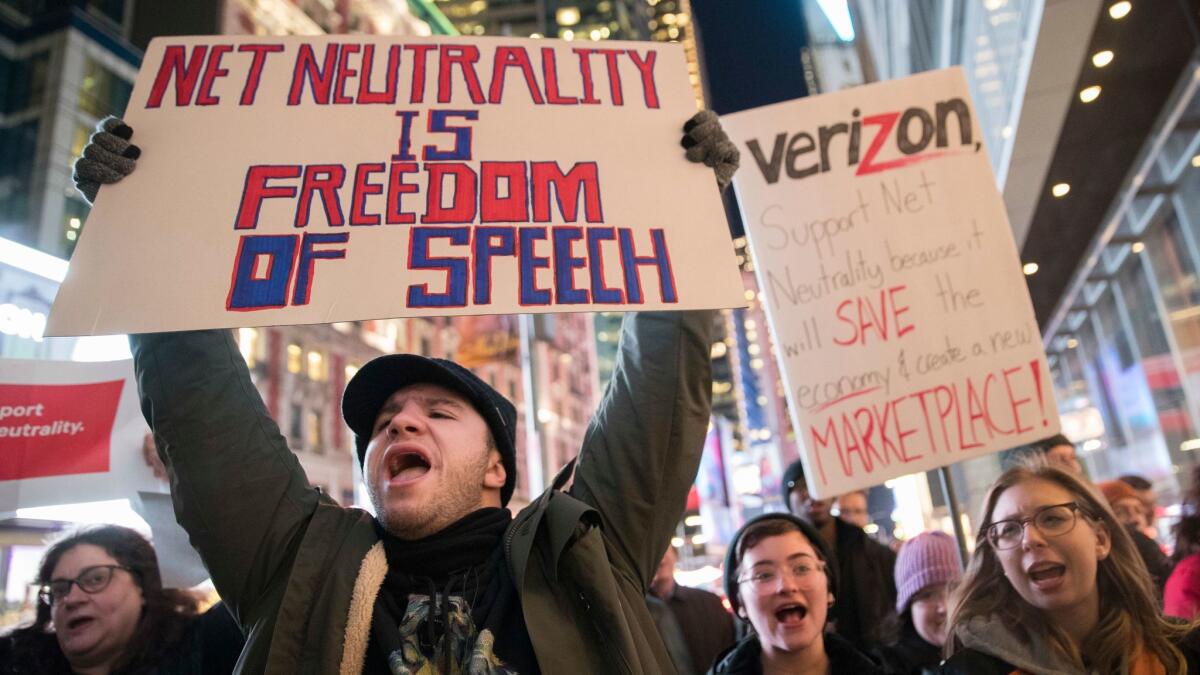Editorial: The FCC sacrifices the free and open Internet on the altar of deregulation

In defending his proposed rollback of federal net neutrality rules, Federal Communications Commission Chairman Ajit Pai has repeatedly said that he’s merely trying to return to the “light touch” regulation that helped make the internet what it is today.
That’s transparently false, and Pai knows it. The deregulation of AT&T, Comcast and other broadband providers that Pai and the commission’s other Republican appointees are expected to approve Thursday is a dramatic abdication of authority that could usher in an ugly new era for individuals and companies that offer content and services online, and for the people who rely on them.
It’s hard to know at this point how altered the internet will be after the dominant local providers of high-speed internet access services are freed to meddle with the traffic on their networks. But merely giving them that freedom could discourage innovation and investment online by creating potential new obstacles to start-ups and others that would compete with deep-pocketed sites and services.
Pai wants the agency that oversees communications networks to wash its hands of the most important communications network of the 21st century.
Pai tried to calm the widespread concerns about the proposed deregulation by writing a “relax, this is no big deal” op-ed for the Washington Times last week. “This plan would simply restore the successful, light-touch regulatory framework that governed the internet from 1996 to 2015,” Pai wrote.
The framework he’s referring to classified internet access as an “information” service, not a “telecommunications” service subject to more intense, utility-style regulation. The commission reclassified internet access as a telecommunications service in 2015, and it’s important to remember why: to bar broadband providers from blocking or throttling data from legal sites and services, from creating fast lanes for sites and services willing to pay for them, and from discriminating unreasonably when managing traffic on their networks. Those protections are all designed to protect the online status quo.
And Pai doesn’t want just to turn back the clock. The deregulation he’s pushing through would renounce any authority or role for the FCC beyond requiring ISPs to be more open with the public about how they manage their networks. In other words, he wants the agency that oversees communications networks to wash its hands of the most important communications network of the 21st century. Instead, Pai would have the Federal Trade Commission and other federal antitrust enforcers guard the public against unfair or deceptive practices by broadband providers.
The obvious problem there is that broadband providers could pick winners and losers online and stay out of trouble for it simply by disclosing that they are, in fact, prioritizing traffic for any online site or service that can afford the fee. No deception and no unfairness, but no neutrality, either. There’s also a realistic fear that broadband providers would favor their own sites and services because some are doing it already — for example, AT&T effectively exempts video streams from its DirecTV subsidiary from its wireless data caps.
Broadband providers insist they can be trusted to preserve the status quo. In a statement Wednesday, leaders of their trade associations promised that the public’s experience online won’t change “in any significant or substantial … meaningful or measurable way.” How reassuring. But in touting the economic benefits of the deregulation, Pai and his GOP colleagues have asserted just the opposite — that broadband providers will use paid prioritization to cut prices and introduce new services, such as remote health monitoring. That’s laughable on both counts. In most markets, broadband access services have no incentive to cut prices — they enjoy either a monopoly or a duopoly in their communities. And the sort of prioritization required for new, time-sensitive services could be done under the old rules.
Again, nothing will change if ISPs don’t pursue whatever profits they might gain from charging for prioritization and favoring their own subsidiaries. The problem is what happens if they do. Under Pai’s approach, the FCC won’t consider complaints about anything other than broadband providers not disclosing what they’re required to disclose.
The ostensible justification for the change is that the tough 2015 neutrality rules discouraged investment in broadband networks. If that really is a problem — the data are disputed — the right solution is for Congress to give the FCC new, less burdensome authority to protect the neutral internet. Instead, the FCC wants to leave the fate of the internet to broadband providers that face little or no competition to keep them honest. Pai’s rules will surely be challenged in court; in the meantime, Congress needs to clean up the mess Pai is creating.
Follow the Opinion section on Twitter @latimesopinionand Facebook
More to Read
A cure for the common opinion
Get thought-provoking perspectives with our weekly newsletter.
You may occasionally receive promotional content from the Los Angeles Times.










